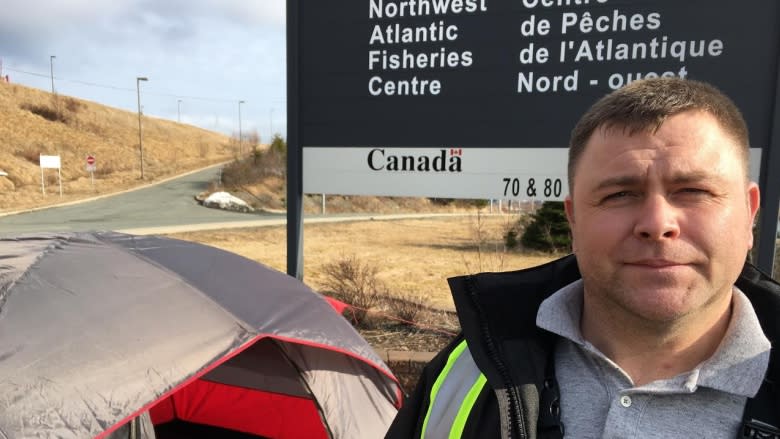Weaker but steadfast: Richard Gillett's hunger strike outside DFO enters 6th day
Fisherman and reality TV star Richard Gillett is now in his sixth day of a hunger strike.
Gillett, who's also vice-president of the Federation of Independent Sea Harvesters of Newfoundland and Labrador (FISH-NL), set up camp outside of the Department of Fisheries and Oceans headquarters in St. John's last week, demanding the department and the federal government at large agree to his requests.
"There are only two ways that I'm coming off this hill, and I'm going to stick to that," Gillett told the St. John's Morning Show on Tuesday.
Gillett, who says he has only had water since he started his hunger strike Thursday, told CBC News he has several underlying health issues, including diabetes. Despite that, he plans to go without food for as long as it takes to get a response from government.
"This had to be done," he said. "I'm not prepared to let the inshore fishery in Newfoundland and Labrador die on my watch after 500 years."
Worse than start of cod moratorium
Gillett said the state of the fishery in the province is even worse than it was at the time of the 1992 cod moratorium, which he lived through as a young boy. He said at least back then harvesters had other species to turn to, but now he said the entire fishery is nearly gone.
He described that dire situation as what drove him to stop eating and set up camp outside of DFO offices, with two demands.
First, he wants a meeting with federal fisheries minister Dominic LeBlanc, so that he can request an independent review of science and management at DFO.
Second, he wants an independent review done to look at the relationship between DFO and the Fish, Food and Allied Workers (FFAW) union.
Gillett said unlike 1992 most harvesters now are much more deeply in debt with expensive vessels and equipment that wasn't necessary for the cod fishery of the early 90s. "It's not the same, but if this collapses it's going to make the cod moratorium look like a church picnic," he said.
Getting weaker, but protest continues
Gillett said after six days of only drinking water, he is starting to lose energy. A doctor came to check him out on Monday and so far he's still able to stand and keep the protest going.
Monday night was a particularly hard one at the camp outside DFO, with strong winds and falling temperatures making for a sleepless night, and even damaging some of the tents.
"I certainly am getting weaker by the day — and cold. I never laid down last night until 2:45 because the tent was blowing away and we were up again in the sleet and the snow and the rain," he said.
"I have my up and downs, and more downs as the days go on than ups."
Two DFO officials came to meet him in his tent Monday, a representative from management and one from science.
He said he asked them if they could identify a fish stock in the province that is prospering, a question he said neither could provide an answer for.
"I said 'It's zero, and if you're telling me that's management of the fishery in Newfoundland and Labrador, than we need to take an independent look at exactly I'm asking for'," he said.
DFO responds
In an email to media, DFO Regional Director Kevin Anderson said the two officials had a constructive and respectful meeting, and that DFO shares the public's concern for Gillett's health.
He also defended the organization's decisions concerning fish quotas, and said those decisions are based on evidence and a mandate to protect public resources.
"We consider all relevant information, including science advice that is in keeping with the precautionary approach, as well as social and economic factors," Anderson's email read.
"We have a robust consultation process that hears the views and opinions of representatives from all sectors of the fish industry, Indigenous groups and other stakeholders.
"Overall, the total allowable catch amounts are set in order to preserve these important resources now and for generations to come."




